|
|
|
Sort Order |
|
|
|
Items / Page
|
|
|
|
|
|
|
| Srl | Item |
| 1 |
ID:
092641
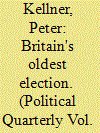

|
|
|
|
|
| Publication |
2009.
|
| Summary/Abstract |
Fringe political parties did well in the European Parliament elections in June 2005. The British National party won their first seats; altogether, four in ten British voters supported a party not represented in the House of Commons at Westminster. YouGov questioned more than 32,000 electors at the time of the election, in order to find out who voted for each party and why: the sample was big enough to enable robust analysis to be done on the BNP, UKIP and Green vote, as well as the supporters of Labour, the Conservatives and the Liberal Democrats. YouGov's findings show that there was disillusionment with the traditional main parties, and fears for the future, that were felt by voters across the political spectrum, and not just the supporters of the fringe parties.
|
|
|
|
|
|
|
|
|
|
|
|
|
|
|
|
| 2 |
ID:
145557


|
|
|
|
|
| Summary/Abstract |
The UK has influenced some major EU policies, such as the creation of the single market and enlargement. But how influential are the UK government and British MEPs in the day-to-day EU legislative process? To answer this question, this article analyses recent data from the Council of the European Union and the European Parliament. The evidence is mixed. In the Council, in recent years the UK government has been outvoted more often than any other EU government, yet UK officials remain well connected ‘behind the scenes’. In the European Parliament, British MEPs are now more likely to be on the losing side than are the MEPs of any other member state, yet British MEPs still win key committee chairs and rapporteurships. The evidence suggests that if the UK votes to remain in the EU, Britain's political elites will need to re-engage with Brussels politics if the UK is to avoid becoming further marginalised from mainstream EU politics.
|
|
|
|
|
|
|
|
|
|
|
|
|
|
|
|
| 3 |
ID:
105707
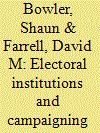

|
|
|
|
|
| Publication |
2011.
|
| Summary/Abstract |
This article develops and tests a number of competing expectations (institutional, party and individual) about what influenced the campaign activity of individual parliamentary candidates for the 2004 European Parliament elections. The principal interest is in the effects of variations in the design of electoral institutions across the Member States of the European Union. Based on the analysis, it is argued that an important distinction needs to be made between campaign effort and campaign goals, with electoral institutional factors having a more significant role over the latter.
|
|
|
|
|
|
|
|
|
|
|
|
|
|
|
|
| 4 |
ID:
169527
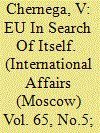

|
|
|
|
|
| Summary/Abstract |
ELECTIONS to the European Parliament that took place on May 23-26. 2019 reflected the far from simple processes that have been unfolding in the European Union for several years now. They confirmed the desire of a fairly big number of voters to see new people among the political elites. The Right and Left centrists that had dominated the parliament for many years lost their traditional majority and, therefore, the chance to elect the chairman among themselves. This was not the only surprise.
|
|
|
|
|
|
|
|
|
|
|
|
|
|
|
|
| 5 |
ID:
142415
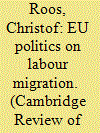

|
|
|
|
|
| Summary/Abstract |
Two European Union (EU) directives on labour migration were adopted in 2009 and 2011. The EU scheme to attract highly qualified migrants, the so-called ‘Blue Card’ directive of 2009, allows member states broad flexibility in implementation. In contrast, the directive on a single permit for migrant workers and their rights of 2011 is far less flexible. It does significantly reduce the scope for derogations at a national level to a minimum. How can this variance in output be explained? Institutional rules are shown to be a key factor. The involvement of the European Parliament as co-legislator alongside the Council limited member states’ influence on legal outputs. The comparison of policy outputs between the two cases points to differences in actor orientations: rather than seeking to increase labour migration into the EU by defining expansive admission conditions, the common EU policy seeks to include migrant workers by defining their rights.
|
|
|
|
|
|
|
|
|
|
|
|
|
|
|
|
| 6 |
ID:
138050


|
|
|
|
|
| Summary/Abstract |
THE BAFFLED European and international media described the results of the May 2014 elections to the European Parliament as revolutionary. On the eve, there had been a lot of talk that the traditional parliamentary majority could be pushed aside; immediately after the elections, the result looked as a political earthquake of sorts.
|
|
|
|
|
|
|
|
|
|
|
|
|
|
|
|
| 7 |
ID:
152595
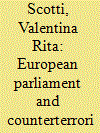

|
|
|
|
|
| Summary/Abstract |
After the entry into force of the Treaty of Lisbon in 2009, and thanks to the better definition of the actors involved in external relations it provided, the European Parliament (EP) has acquired a greater role in European Union’s (EU’s) foreign policy and increased its ability to deal with countries outside the EU using existing interparliamentary meetings. This evolution of the EP has occurred while other important and related developments were taking place: the emergence of a global terrorist threat and the so-called Arab Spring, which has spanned most Arab countries since 2011. This essay aims at understanding how the EP’s diplomacy reacted to the challenge of balancing the promotion of EU values with the need for cooperation for security and stability. It uses as a case study the EP’s relations with southern Mediterranean countries (SMCs). First, a general overview of the counterterrorist activities laid down by the EP toward SMCs is provided. Then the essay focuses on the activity of EP’s delegations with the Maghreb and the Mashreq, with reference to cooperation on counterterrorism with Algeria, Egypt, Morocco, and Tunisia. Finally, concluding remarks compare the general EU approach to counterterrorism in SMCs with that of the EP, discussing some existing criticisms and highlighting that the EP proved to be a coherent actor toward SMCs.
|
|
|
|
|
|
|
|
|
|
|
|
|
|
|
|
| 8 |
ID:
052865
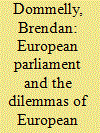

|
|
|
|
|
| Publication |
Apr-Jun 2004.
|
|
|
|
|
|
|
|
|
|
|
|
|
|
|
|
| 9 |
ID:
138870
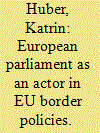

|
|
|
|
|
| Summary/Abstract |
This contribution focuses on the European Parliament (EP) as an actor in European Union (EU) border policies. It situates the Parliament in the dynamics of the Schengen project and discusses the distinct role it plays therein, as well as its impact thereon. The article argues that the EP managed to establish itself, years before the entry into force of the Lisbon Treaty, as a credible actor in border policies able to bring the citizens’ perspective into EU border policies. With its keen interest in the Schengen area as an area in which citizens can move freely without being subject to border controls, and with its focus on fundamental rights, it played, and continues to do so, a role in ensuring that “Schengen works”. The article presents its powers and the interplay with the other EU institutions, mainly on the basis of a number of key examples.
|
|
|
|
|
|
|
|
|
|
|
|
|
|
|
|
| 10 |
ID:
116196
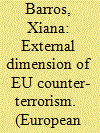

|
|
|
|
|
| Publication |
2012.
|
| Summary/Abstract |
Since 11 September 2001, the European Union (EU) has significantly increased its involvement in counter-terrorism. A sizeable cluster of those new EU counter-terrorism acts were challenged in front of the European Court of Justice, and many of those acts ended being annulled by the Court. In the foreign dimension, the European Parliament challenged three counter-terrorist acts: the first Transatlantic Agreement on passenger name records, the EU technical assistance to the Philippines and the EU UN terror list. The analysis of the nature and implications of these three cases shed light on the evolving configuration of the EU foreign policy in terms of both institutional design and ideological choices.
|
|
|
|
|
|
|
|
|
|
|
|
|
|
|
|
| 11 |
ID:
129207
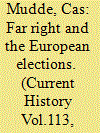

|
|
|
|
|
| Publication |
2014.
|
| Summary/Abstract |
If we are to believe the international media, this is going to be the year of the "far right anti-European populists." In the first three days of 2014, The New York Times published two opinion essays warning of the far right's rise, while The Economist focused its first issue of the year on "Europe's Tea Parties." Before this came months of public warnings of a "European populist backlash" issued by prominent European Union politicians, including the presidents of the EU, the European Commission, and the European Parliament (EP), and by national politicians, such as Italian Prime Minister Enrico Letta and Dutch Deputy Prime Minister Lodewijk Asscher. While the warnings have employed different terms and point to somewhat different groups
|
|
|
|
|
|
|
|
|
|
|
|
|
|
|
|
| 12 |
ID:
155709
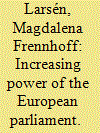

|
|
|
|
|
| Summary/Abstract |
Since the Lisbon Treaty increased the legal role of the European Parliament (EP) in EU trade policy, there has been a debate about the extent to which these legal competencies have translated into actual influence over the content and outcome of EU trade negotiations. Using the trade negotiations between the EU and India as a case study, this article argues that the impact of the EP has indeed been significant. Through two-level game analysis, which extends its domestic focus to include the EP as a domestic constituent, it demonstrates how the EP has affected the EU win-set in ways that have both hindered and facilitated agreement at the international level between the EU and India. It also shows how the EP has affected the negotiating dynamics and how the EU negotiators have had their preferences somewhat compromised by the EP in their attempt at reaching an agreement with India.
|
|
|
|
|
|
|
|
|
|
|
|
|
|
|
|
| 13 |
ID:
150342


|
|
|
|
|
| Summary/Abstract |
allowance (EUA) prices and volatility. Reductions in price and increases in volatility are observed when EP decisions are (i) not “party-political” in origin, (ii) made during times of low market sentiment, or (iii) made during times of low market attention. Daily EUA prices from 2007 to 2014 are used in the study, with decisions analysed using an event study approach for price impact, and a GARCH specification for volatility impact. Our findings suggest the need for policymakers to improve communication of long-term strategies for the EUA market. This aims to reduce the evident ongoing uncertainty experienced by traders around each decision made by the EP. The finding that sentiment and market attention at the time of an EP decision influences the market's reaction indicates a need to consider market dynamics in terms of decision timing, so that market turbulence is not an unintended by-product of an EP decision. Some form of medium term forward guidance may be called for.
|
|
|
|
|
|
|
|
|
|
|
|
|
|
|
|
| 14 |
ID:
190130
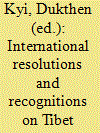

|
|
|
|
|
| Publication |
Dharamshala, Tibetan Information Society (DIIR), 2023.
|
| Description |
xii, 502p.hbk
|
| Standard Number |
9788195568505
|
|
|
|
|
|
|
|
|
|
|
|
Copies: C:1/I:0,R:0,Q:0
Circulation
| Accession# | Call# | Current Location | Status | Policy | Location |
| 060354 | 951.5/KYI 060354 | Main | On Shelf | General | |
|
|
|
|
| 15 |
ID:
180563
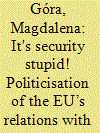

|
|
|
|
|
| Summary/Abstract |
The European Union’s security depends on how stable and peaceful its neighbours are, and yet the security situation around it has been deteriorating in recent years. The EU policies designed to stabilise the neighbourhood – the European Neighbourhood Policy (ENP) and EU enlargement – were originally designed as “low politics” of foreign policy focusing on economic instruments and tools of democratisation, but in time security became a prime concern. The article firstly shows how the European Parliament and national parliaments narrate these challenges in the neighbourhood and how security-related concerns become central to the ENP and enlargement. Secondly, in capturing the security concerns, it also shows how such changes contribute to the politicisation of relations with neighbours and how these processes differ between national and supranational level. Empirically, the politicisation of the ENP and EU enlargement in national parliaments (the UK, Poland and Ireland) and the European Parliament between 2004 and 2014 is compared and analysed.
|
|
|
|
|
|
|
|
|
|
|
|
|
|
|
|
| 16 |
ID:
174018


|
|
|
|
|
| Summary/Abstract |
This paper seeks to uncover what drives European Parliament (EP) discussions on a privileged partnership for Turkey. In line with Habermas’s Communicative Action Theory, it scrutinizes the justifications used by the Members of the European Parliament (MEPs) in the Plenary Sessions between 2005–2012, i.e. from the start of accession negotiations until the privileged partnership’s falling into disuse in EP discussions. The research reveals that the alleged benefits of privileged partnership in contrast to the costs of Turkey’s full membership constitute the backbone of the right-wing groups’ arguments whereas the objection to a privileged partnership is justified by MEPs from left-wing groups for being against the EU’s official commitments to Turkey. In disputing Turkey’s full membership, the members of the right-wing parties reconstruct a European identity in which Turkey is the constitutive other.
|
|
|
|
|
|
|
|
|
|
|
|
|
|
|
|
| 17 |
ID:
095294
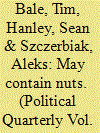

|
|
|
|
|
| Publication |
2010.
|
| Summary/Abstract |
The British Conservative Party's decision to leave the European Peoples' Party-European Democrats (EPP-ED) group in the European Parliament and establish a new formation-the European Conservatives and Reformists (ECR)-has attracted criticism, much of it focused on the supposedly extremist politics and character of the partners with which the Conservatives have chosen to work. In fact, while those parties which have joined the Conservatives in the new group are for the most part socially conservative, they are less extreme and more pragmatic than their media caricatures suggest. Moreover, such caricatures obscure some interesting incompatibilities within the new group as a whole and between some of its Central and East European members and the Conservatives, not least with regard to their foreign policy preoccupations and their by no means wholly hostile attitude to the European integration project.
|
|
|
|
|
|
|
|
|
|
|
|
|
|
|
|
| 18 |
ID:
118528
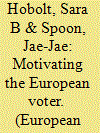

|
|
|
|
|
| Publication |
2012.
|
| Summary/Abstract |
Voters behave differently in European Parliament (EP) elections compared to national elections because less is at stake in these 'second-order' elections. While this explains the primary characteristic of EP elections, it has often led to a conflation of distinct motivations for changing behaviour - namely sincere and protest voting. By distinguishing these motivations, this article addresses the question of when and why voters alter their behaviour in EP elections. In addition, it argues that the degree of politicisation of the EU in the domestic debate shapes the extent to which voters rely on EU, rather than national, considerations. These propositions are tested in a multilevel analysis in 27 countries in the 2009 EP elections. The findings have important implications for understanding why voters change their behaviour between different types of elections.
|
|
|
|
|
|
|
|
|
|
|
|
|
|
|
|
| 19 |
ID:
145303
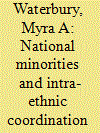

|
|
|
|
|
| Summary/Abstract |
This article investigates the role that intra-ethnic coordination and kin-state alliances play in shaping how parties that represent national minority groups approach their participation in the European Parliament (EP). This is done through an analysis of the political behaviour—electoral strategy, party group choice and modes of interest assertion in the EP—of ethnic minority parties in five Central and East European countries. The article finds that the role of intra-ethnic coordination and kin-state alliances is limited at the level of EP elections, but significant at the level of party group choice and in the visibility of minority issues in the EP.
|
|
|
|
|
|
|
|
|
|
|
|
|
|
|
|
| 20 |
ID:
110687


|
|
|
|
|
| Publication |
2011.
|
| Summary/Abstract |
IN 1849, the year of the "spring of nations," a peace congress took place in Paris. The main address given by Victor Hugo, the most famous author of the time, announced that One hundred sixty years have passed since this noble vision was enounced; a European parliament of sorts has come into being, but not exactly a European brotherhood, and one suspects that Victor Hugo would still not be too happy with the present state of the Continent.
|
|
|
|
|
|
|
|
|
|
|
|
|
|
|
|
|
|
|
|
|